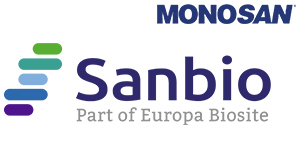Mouse anti-PAI-1, clone MA-33H1F7 (Monoclonal)
Mouse anti-PAI-1, clone MA-33H1F7 (Monoclonal)
Artikelnummer
SANMON7074
Verpackungseinheit
1 ml
Hersteller
Sanbio / Monosan
Verfügbarkeit:
wird geladen...
Preis wird geladen...
Clone Number: MA-33H1F7
Immunogen: Unknown or proprietery to MONOSAN and/or its suppliers
Concentration: 100 ug/ ml
Storage buffer: PBS with 0.1% BSA and 0.02% sodium azide
Additional info: Plasminogen activator inhibitor type-1 (PAI-1), a member of the serine protease inhibitor (serpin) superfamily, is an important protein in the regulation of fibrinolysis. PAI-1 is unique among the serpins because of its functional and conformational flexibility. PAI-1 is the most important physiological inhibitor of both tissue-type plasminogen activator (t-PA) and urokinase-type plasminogen activator (u- PA). Increased PAI-1 levels are associated with thrombotic events and is an established risk factor for cardiovascular diseases. The active conformation PAI-1 inhibits its target proteinases by the formation of a stable, inactive complex. Although PAI-1 is synthesized as an active molecule, it converts spontaneously to an inactive, latent form that can be partially reactivated by denaturing agents. In addition, a third conformation reacting as a non-inhibitory substrate towards various target proteinases has been identified.
The epitope of monoclonal antibody MA-33H1F7 is predominantly composed of three residues (Lys154/Glu130/Arg131), positioned virtually linearly in the three-dimensional structure. The epitope of the antibody does not cover the complete alpha-helix F and turn connecting alpha-helix F and beta-strand s3A, but is restricted to the hinge region between alpha-helix F and the main part of the PAI-1 molecule.
The monoclonal antibody MA-33H1F7 is a ‘switching’ antibody, capable of inducing a non-inhibitory substrate form of PAI-1. It was shown to inhibit PAI-1 in a dose dependent manner.
References: Debrock; S et al. Biochim Biophys Acta 1997; 1337: 257/Berry, C et al Br J Pharm 1998, 125: 29/Bijnens; A et al. J Biol Chem 2000; 275: 6375
Immunogen: Unknown or proprietery to MONOSAN and/or its suppliers
Concentration: 100 ug/ ml
Storage buffer: PBS with 0.1% BSA and 0.02% sodium azide
Additional info: Plasminogen activator inhibitor type-1 (PAI-1), a member of the serine protease inhibitor (serpin) superfamily, is an important protein in the regulation of fibrinolysis. PAI-1 is unique among the serpins because of its functional and conformational flexibility. PAI-1 is the most important physiological inhibitor of both tissue-type plasminogen activator (t-PA) and urokinase-type plasminogen activator (u- PA). Increased PAI-1 levels are associated with thrombotic events and is an established risk factor for cardiovascular diseases. The active conformation PAI-1 inhibits its target proteinases by the formation of a stable, inactive complex. Although PAI-1 is synthesized as an active molecule, it converts spontaneously to an inactive, latent form that can be partially reactivated by denaturing agents. In addition, a third conformation reacting as a non-inhibitory substrate towards various target proteinases has been identified.
The epitope of monoclonal antibody MA-33H1F7 is predominantly composed of three residues (Lys154/Glu130/Arg131), positioned virtually linearly in the three-dimensional structure. The epitope of the antibody does not cover the complete alpha-helix F and turn connecting alpha-helix F and beta-strand s3A, but is restricted to the hinge region between alpha-helix F and the main part of the PAI-1 molecule.
The monoclonal antibody MA-33H1F7 is a ‘switching’ antibody, capable of inducing a non-inhibitory substrate form of PAI-1. It was shown to inhibit PAI-1 in a dose dependent manner.
References: Debrock; S et al. Biochim Biophys Acta 1997; 1337: 257/Berry, C et al Br J Pharm 1998, 125: 29/Bijnens; A et al. J Biol Chem 2000; 275: 6375
| Artikelnummer | SANMON7074 |
|---|---|
| Hersteller | Sanbio / Monosan |
| Hersteller Artikelnummer | MON7074 |
| Verpackungseinheit | 1 ml |
| Mengeneinheit | STK |
| Reaktivität | Human, Mouse (Murine), Rat (Rattus), Rabbit |
| Klonalität | Monoclonal |
| Methode | Western Blotting, ELISA, Functional Assay |
| Isotyp | IgG1 |
| Wirt | Mouse |
| Konjugat | Unconjugated |
| Produktinformation (PDF) | Download |
| MSDS (PDF) |
|

 English
English







